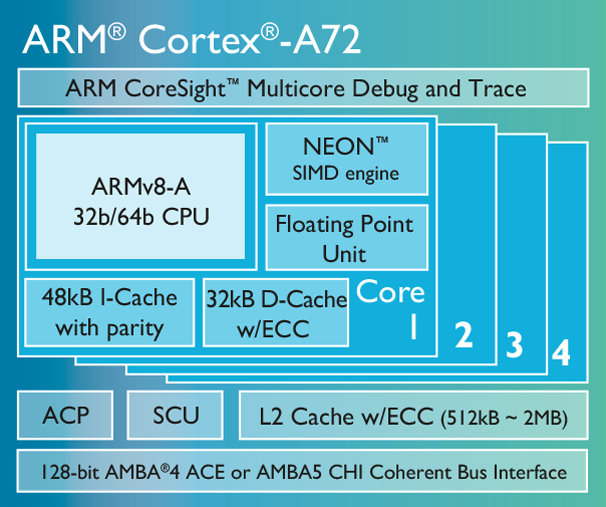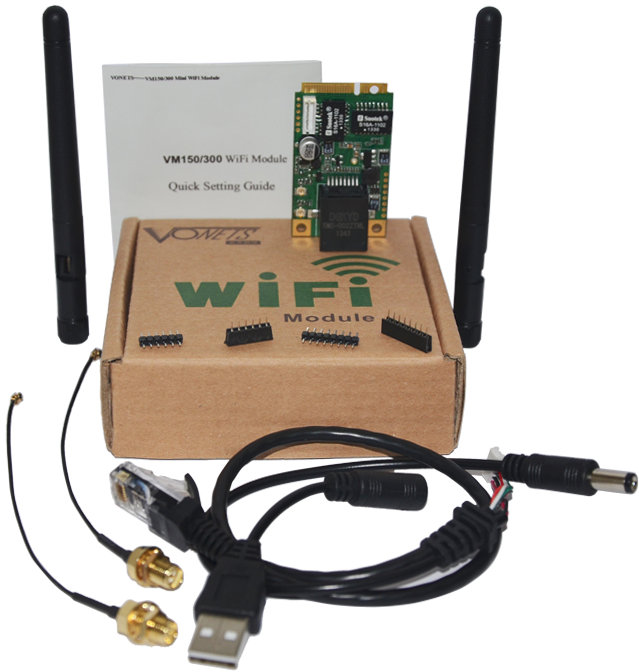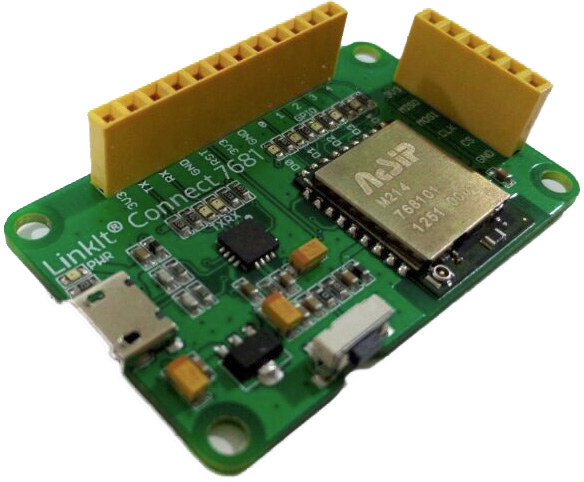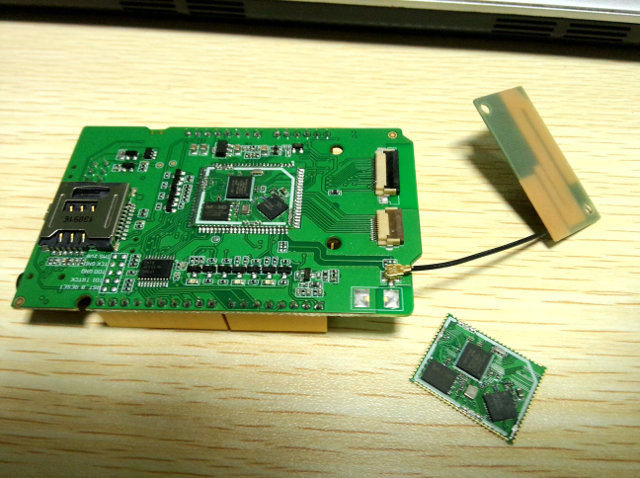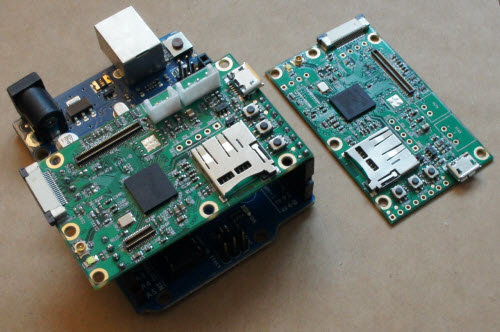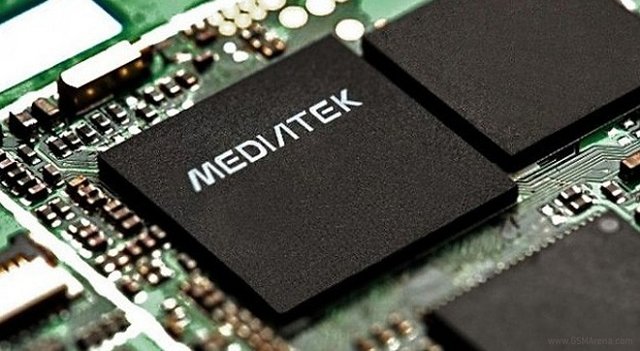ARM has just announced their new Cortex A72 ARMv8 core with 3.5 times the performance of Cortex A15 ARMv7 cores, together with Mali-T880 GPU delivering 1.8 times the performance of Mali-T760, and CoreLink CCI-500 Cache Coherent Interconnect to link the new CPU, GPU and I/Os together. ARM Cortex A72 Some of the key features of the new core include: Architecture – ARMv8-A Multicore – 1-4x SMP within a single processor cluster, and multiple coherent SMP processor clusters through AMBA 5 CHI or AMBA 4 ACE technology ISA Support AArch32 for full backward compatibility with ARMv7 AArch64 for 64-bit support and new architectural features TrustZone security technology NEON Advanced SIMD DSP & SIMD extensions VFPv4 Floating point Hardware virtualization support Cache – 48KB I-cache, 32KB D-cache, and 512 KB to 2MB L2 cache with ECC Debug & Trace – CoreSight DK-A57 Process – 16nm FinFET A cluster can support up to […]
Vonets VM300 Wi-Fi & Ethernet IoT Board with Mediatek MT7620 Runs OpenWRT
Mediatek MT760 is a recent Wi-Fi SoC found in some Nexx WT3020 routers, and WRTnode development board. Both run OpenWRT and costs $17 to $30 depending on the amount of flash, and ports with the former featuring two Ethernet ports, and the latter access to GPIOs. You could probably open the case of the Nexx routers and solder some wires to get access to GPIO, and you can hack an Ethernet cable for WRTnode, but another options could be Vonets WM300 kit that includes a board with Wi-Fi and Ethernet, a cable for USB / Ethernet connection, headers for GPIOs, and two external antennas for less than $30. An OpenWRT SDK is also provided for the kit. Specifications listed for VM300 board: Processor – Mediatek MT7260N MIPS processor @ 580MHz Storage – 4MB SPI Flash (option: 8MB/16MB) for firmware System Memory – 32MB or 64MB SDRAM Connectivity Wi-Fi Single band […]
LinkIt Connect 7681 is a Wi-Fi IoT Board Powered by Mediatek MT7681
So it looks like Mediatek has decided to carry on with its Mediatek Labs endeavours, as after launching LinkIt ONE last year, they’re about to introduce LinkIT Connect 7681, a development board with a Mediatek MT7681 based Wi-Fi module, and access to various GPIOs. LinkIt Connect 7681 HDK (Hardware Development Kit) specifications: SoC – Mediatek MT7681 Andes N9 processor @ 80 MHz with 64KB RAM, Storage – 1MB SPI Flash for firmware Connectivity – Wi-Fi: 802.11 b/g/n for Station mode; 802.11 b/g for AP mode via a MT7681 module by AcSIP Headers – 12-pin header for UART, 5 GPIOs (also usable as software PWM), RESET, and 3.3V/5V/GND; 6-pin header for SPI, 3.3V and GND. USB – 1x micro USB for power and programming/debugging Misc – Reset push-button, 2x UART LEDs Power Supply – On-board 1A 3.3V voltage regulator (can be powered from USB connector) I/O Voltage – 3.3V for GPIO […]
LinkIt A-Core Packs Mediatek MT2502A SoC into a Tiny Module for Wearables
LinkIt ONE is a development board based on Meditak MT2502A SoC for wearables, and developed by SeeedStudio. With GPS, Wi-Fi, and GSM/GPRS connectivity, and a LiPo battery, it’s great to experiment IoT or wearable applications, but if you plan to launch an actual product, it could be nice to have a module, and built a baseboard around it. That’s exactly what SeeedStudio is working with LinkIt A-Core module. LinkIT A-Core module specifications: SoC – Mediatek MT2502AV ARM7 SoC @ 260 MHz with 32MB PSRAM and 32MB Flash on-chip. External Storage – 16M external Flash (MX25U12835F) Cellular Connectivity – GSM/GPRS quad-band 850/900/1800/1900MHz with RF7198 RF transmitter. Connectivity – Bluetooth 2.0 / 2.0 EDR / 4.0, GPS compatible GPS/GNSS (requires external GPS module) Expansion – 48 general purpose digital I/O Power supply: DC 3V~4.2V Power Consumption – > 3mA Dimensions – 19x23x2 mm The module is still in development, and the company welcomes […]
Fernvale Open Source Hardware IoT Board Based on Mediatek MT6260 SoC with GSM Connectivity
Andrew Huang (Bunnie), an hardware engineer, known for hacking the original XBOX, and more recently for Novena open source laptop, has decided it could be interesting to reverse-engineer Mediatek MT6260 processor, as in China, it’s difficult to get documentation, SDK, and tools if you don’t commit to purchase X chips, where X is a rather large number. He and others also checked whether their work could be open sourced legally, and assert their “fair use” rights to reverse-engineer hardware and firmware. And so Fernvale project was born both as a technical challenge and to make a point. MT6260 is a $3 ARM7EJ-S processor clocked at 364 MHz with 8MB built-in RAM, interfaces such as I2C, SPI, PWM, UART, as well as LCD and touchscheen controller, and audio codec, battery charger, USB, Bluetooth, and GSM support, which make the $6 Atmel MCU used in Arduino board look expensive. The main differences […]
Mediatek MT8173 Quad Core big.LITTLE ARM Cortex A72/A53 Processor Code Submitted to Linux Mainline
[Update: MT8173 processor has now been announced, and it’s using Cortex A72 and A53 instead of A57/A53, as initially shown in the Linux kernel source code] Mediatek is not exactly known to compliant with open source licences, or be involved with the open source community. But the company is certainly going into the right direction with their cooperation with Google leading to source code release for Android One smartphones, and the recently launched Mediatek Labs for community projects, starting with LinkIt One IoT platform. Mediatek is also regularly submitting code to the Linux ARM Kernel mailing list, and yesterday code was submitted for Mediatek MT8173 SoC, a 64-bit ARMv8 processor with two Cortex 53 and two Cortex 57 cores in big.LITTLE configuration. As far as I know, it could be the first Mediatek SoC with “big” Cortex A57 cores. Code snippet from mt8173.dtsi related to CPU cores:
|
1 2 3 4 5 6 7 8 9 10 11 12 13 14 15 16 17 18 19 20 21 22 23 24 25 26 27 28 29 30 31 32 |
cpus { + #address-cells = <1>; + #size-cells = <0>; + + cpu0: cpu@0 { + device_type = "cpu"; + compatible = "arm,cortex-a53"; + reg = <0x000>; + enable-method = "psci"; + }; + + cpu1: cpu@1 { + device_type = "cpu"; + compatible = "arm,cortex-a53"; + reg = <0x001>; + enable-method = "psci"; + }; + + cpu2: cpu@2 { + device_type = "cpu"; + compatible = "arm,cortex-a57"; + reg = <0x100>; + enable-method = "psci"; + }; + + cpu3: cpu@3 { + device_type = "cpu"; + compatible = "arm,cortex-a57"; + reg = <0x101>; + enable-method = "psci"; + }; + }; |
A short […]
Camera Not Working on Your Smartphone? No problem, Massage It!
I bought ThL W200 last year as my main (and only) phone, and my review was rather positive, because after testing the phone for a week or so I did not encounter some of the issues. After a short while I found GPS was not working very reliably, so I had to find instructions to fix GPS on Mediatek phones, then the first battery died after about 8 months, maybe that’s normal for my usage, but I was expecting it to last longer. Finally, after a while both front and rear cameras started to have issues such as green screen, color lines, or simply refusing to work with the message: “can’t connect to camera”. In all of this the good news (for me) was I was not alone, and I saw some instructions saying, you had to terminate the camera app, clear all data, and restart the phones. It seemed […]
Linux 3.17 Released
Linus Torvalds announced the release of Linux Kernel 3.17 on Sunday: So the past week was fairly calm, and so I have no qualms about releasing 3.17 on the normal schedule (as opposed to the optimistic “maybe I can release it one week early” schedule that was not to be). However, I now have travel coming up – something I hoped to avoid when I was hoping for releasing early. Which means that while 3.17 is out, I’m not going to be merging stuff very actively next week, and the week after that is LinuxCon EU… What that means is that depending on how you want to see it, the 3.18 merge window will either be three weeks, or alternatively just have a rather slow start. I don’t mind getting pull requests starting now (in fact, I have a couple already pending in my inbox), but I likely won’t start processing […]


